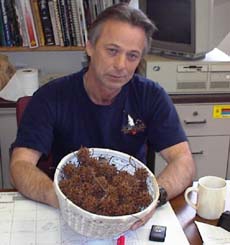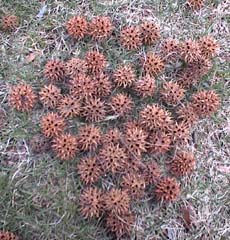|
Lincoln
Daily News:
easier to navigate, easier to read
[MARCH
15, 2000] In
keeping up with our increased readership, Lincoln Daily
News has made some improvements to the site.
It is now easier to navigate.
Every article in the entire paper is accessible
from every page. Just
scroll down to the bottom of every page and see the index,
which lists the title of every section.
After reading an article you can click on the next
column of choice and you will quickly jump to that page.
This will enable YOU to choose what you read.
|
|
Choosing
to go back to the front page is now easier than ever too.
Simply click on the Lincoln Daily News logo located
on the top left of every screen. It says "back to
front" and it will take you there.
The
Lincoln Daily News has been online now for nearly
seven weeks. We have continued our commitment from the
beginning: to research and report the news and commentary
from our community in a truthful and straightforward
manner. There are many exciting things happening in our
towns in and around Logan County. As the days and weeks
and months go by, we strive to maintain the things you
have come to expect from LDN.
|

So,
let us know what you think. How are we doing? We are here
for our readers. If you have story ideas or know of
anything that is up and coming in your town, let us know.
If you want to let us know about the improvements made on
the site email us. ldneditor@lincolndailynews.com
[LDN]
|
|
|
Sheriff’s
deputies go high tech
[MARCH
15, 2000] Felons
intending to commit a crime in Logan County should be
forewarned that their criminal records are as close as the
touch of a computer key. The two Logan County K-9
sheriff’s deputies will soon be receiving the latest in
police technology. Thanks to $16,500 in drug forfeiture
monies provided by Logan County State’s Attorney Bill
Workman, the two K-9 units will have touch-screen laptops
that will be mobile with the police unit. These computers
will give officers instant access to anyone’s criminal
record information.
|
|
The
new system will reduce the need for much of the radio
communications between the officer and police dispatch,
because the officer will have that information available
through the high-tech unit in their own patrol vehicle.
“Because
of the successful drug asset forfeitures, I am able to
provide the funding for this enhancement to the law
enforcement community. It is through their hard work and
dedication to the war on drugs that these funds were
confiscated in the first place,” Bill Workman said. The
money comes from cash and other assets that have been
seized from drug dealers. Workman explained that when
money is seized from drug offenders in the course of their
prosecution, his office conducts a forfeiture proceeding.
The cash or assets that are forfeited to the state become
the property of law enforcement to be used to assist in
the prosecution of drug offenses.
In
the past Workman has used these funds to update the
computerization of the state’s attorney’s office,
equip the prosecutors with up-to-date technology and
assist in the overall prosecution of drug cases. “Due to
the success of our drug prosecutions and seizures the last
three years, we are able to not only meet the needs of our
own office, but apply some of the funds to law enforcement
directly. I feel it is a positive and productive use of
these funds to put some of it back into the local
community to fight drug crimes,” Workman said.
|

Sheriff
Tony Solomon expressed his appreciation to State’s
Attorney Bill Workman for his willingness to share funding
out of his drug forfeiture account. “The Logan County
Sheriff’s Department will benefit by Bill Workman’s
assistance and support of our agency. This technology will
allow officers to access critical information immediately,
and substantially increase our ability to protect and
serve the public,” Sheriff Solomon said.
[LDN]
|
|
|
The
ABCs of B & B's
Chamber
to hold bed and breakfast workshop
[MARCH
14, 2000] Could
a bed and breakfast—or perhaps more than one—be in
Logan County’s future once again? It’s a possibility
that the Lincoln/Logan County Chamber of Commerce and Main
Street Lincoln are encouraging interested persons to
explore. The two groups are sponsoring a Bed and Breakfast
Start-up Workshop on March 30 from 8 a.m. to noon at
Eckert’s, 123 S. Sangamon St. in Lincoln.
|
|
The
workshop will provide insights from experienced B & B
operators and patrons, along with information about
zoning, health department regulations, business plans,
financing and marketing techniques. A $10 registration fee
will cover the cost of materials and breakfast. Anyone
interested may call the Chamber at 735-2385 for more
information.
Representatives
of several area organizations said they believe the
Lincoln area offers opportunities for those wanting to
start such a home-based business.
"Currently,
Logan County does not have a ‘home-style’ place to
stay," says Bobbi Abbott, Chamber director. She says
that more and more travelers are looking for such
accommodations for both weekend getaways and business
trips. They find the advantages of staying at a B & B
include the opportunity to mingle with other guests and to
learn more about the area from their hosts, along with
less traffic congestion, more amenities and sometimes
lower rates than traditional accommodations.
"I
get calls from all over from people wanting to know if
there is a B & B here," says Thressia Usherwood,
executive director of the Abraham Lincoln Tourist Bureau
of Logan County. "I think B & B’s could become
very successful here. People love them."
Usherwood
thinks that as the Looking for Lincoln project gains
momentum, more and more tourists will be coming into the
area. The Looking for Lincoln project, funded by a state
of Illinois Heritage Tourism grant, will identify
important Lincoln sites and publish a guidebook so that
tourists can follow a "trail" of places
important in the history of our 16th president.
"There
is a wealth of Abraham Lincoln history here,"
Usherwood said. Sites in Logan County that will be listed
in the guidebook include the Postville Courthouse, the
Mount Pulaski Courthouse and the Lincoln College Museum of
Lincoln memorabilia. She also noted that Lincoln is a
popular stop for the Illinois Route 66 Association, which
will be holding its Hall of Fame banquet here this year.
|
According
to Abbott, studies show that B & B patrons often spend
more time and money in the community than those who stop
in off-the-highway motels. She notes that unique
restaurants, antique malls and specialty shops are of
particular interest to people who stay in B & B’s.
"We have many small, local businesses that can
benefit from B & B tourism. The Chamber and Main
Street will help market our local businesses to these
patrons."
Wendy
Bell, Main Street Lincoln program manager, also supports
the workshop. "There are marketing opportunities
through Amtrak and Main Street that do not exist in other
areas. A bed and breakfast would complete the package of
good food, interesting shops, and a unique place to
stay."
The
March 30 workshop is designed to offer "information
and inspiration," Abbott said. "There is
absolutely no obligation. We’re hoping this forum will
appeal to anyone with a curious to a serious interest in
this type of home-based business.
"We
presently have two persons with serious interest. We’d
like to attract a few more. Clusters of bed and breakfasts
tend to draw more tourists than a single offering,"
Abbot continued.
"The
operators will eventually be able to put together
attractive packages featuring unique travel experiences—riding
the train, bicycling, or driving Route 66," she said.
[Joan
Crabb]
|
|
|
A
not so sweet fruit
[MARCH
9, 2000]
The
brown fruit of the sweet gum tree is creating problems for
local homeowners. The
sweet gum tree is a tall, stately tree that grows
throughout most of the United States, with Central
Illinois being at the northernmost perimeter of its
region. Its
fruit is a brownish spiny ball that remains on the tree
throughout the winter.
This fruit plugs up drains, continuously litters
yards and is a big nuisance, says Don Osborne, street
superintendent of Lincoln.
“The city’s policy has been not to remove trees
unless they are dead, diseased, dying or dangerous,” he
continued.
|
|
There
is no chemical control currently labeled in Illinois for
preventing the formation of sweet gum balls. There are a
few compounds available that will cause some abortion but
it is costly, hard to apply and again not registered for
use in Illinois. For those residents who are adamant about
removing their sweet gum tree, there may be a remedy.
An
Illinois group of old-house enthusiasts says the only
control to prevent sweet gum balls from forming is a chain
saw used at ground level. The city of Lincoln may now
agree. Osborne mentioned, "We don’t want to get to
the point where residents are just removing trees."
But due to the number of complaints received from
residents with sweet gum trees on their property, the city’s
forestry committee has made a recommendation to the city
council to try to alleviate this problem for residents.

Osborne
said, "If the recommendation is approved, residents
would have to first obtain a free permit from city hall
and agree to bear the full cost for the tree removal. They
would also have to pledge to replant a tree in the same or
surrounding area. The exception to replanting would be if
the tree would have a negative impact, such as on
utilities, blocking the view at an intersection or some
other legitimate reason for not replanting. The city of
Lincoln has a list of prohibited and acceptable trees that
can be used to replenish the trees that may be cut down.
Tree replacements can be picked from this list such as
oaks, several varieties of maples and others."

|
The
sweet gum tree produces a gummy compound called stroax
that is used in making perfumes, adhesives and salves.
Sweet gum wood is fairly hard and heavy. It is often used
to make veneer, cabinets, boats, toys, boxes, fuel and
other products. The leaves are star-shaped, with a
pleasant fragrance when crushed. The bark is deeply
furrowed into narrow scaly ridges; hence another common
name, the alligator tree.
The
sweet gum tree is a common broadleaf tree, a good shade
tree, and amongst the most brilliant in autumn. Native
Americans and early pioneers chewed the hardened clumps of
sap that exuded from the bark of the tree when cut. They
used it for medicinal purposes, as chewing gum and with
some tree varieties as a breath freshener.

Local
lore says a Lincoln naturalist who obtained the trees as
seedlings brought the sweet gum trees to Lincoln in the
early to late 1960s. He then gave them to the city of
Lincoln to plant.
[Kym
Ammons-Scott]
|
|
|
Back
to top
|
|
Top
Stories | Sports Talk
| Weather
A
Day in the Life | Hearsay & Hairspray | Milestones
| Obituaries | Diaspora
Business
& Ag | Organizations &
Events | Good
Neighbors | Honors & Awards
| Ombudsman | Law
& Courts
The
Arts | Family Life
| Spiritual Life | Health
& Fitness | Teaching
& Learning | Book
Look | Movies &
Videos
the
em space | Where They
Stand | How We Stack Up
| By the Numbers
Letters
to Editor | About LDN
| Corrections | Happy
Ads | Classified
Ads
|
|



